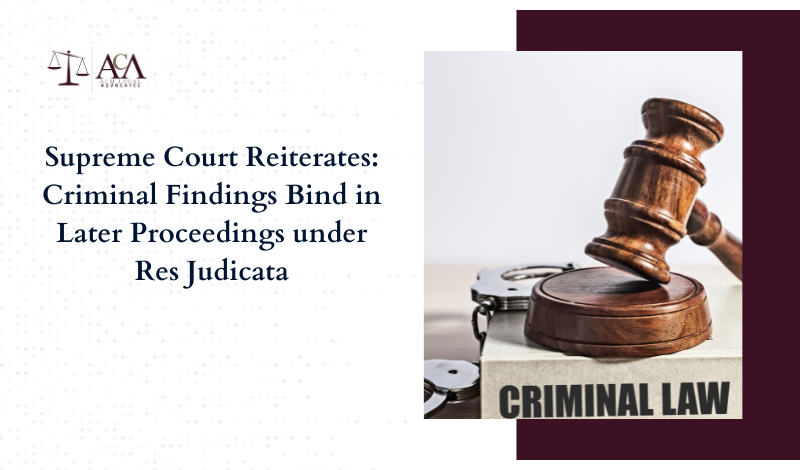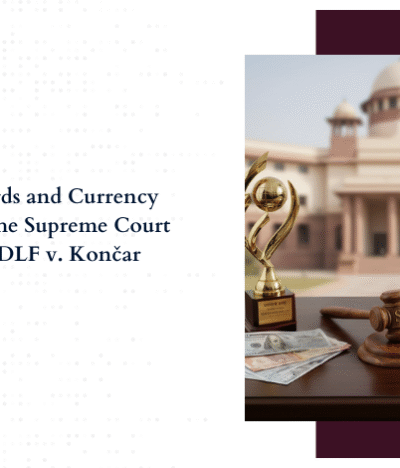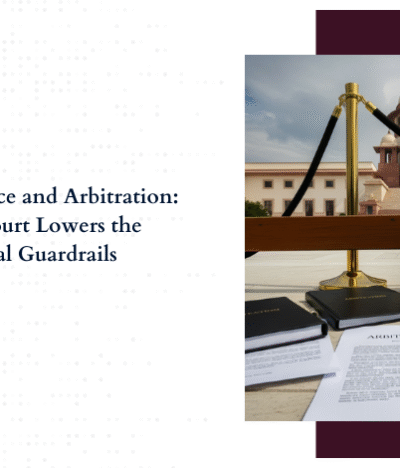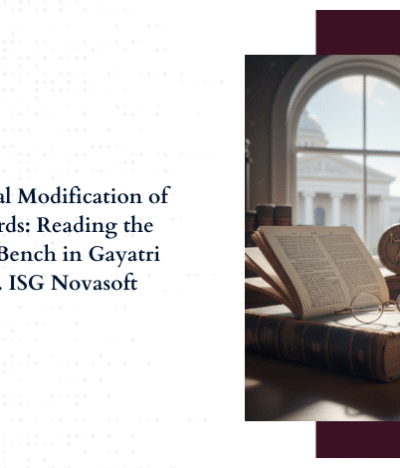Reopening Closed Chapters in Criminal Law
In a significant pronouncement that adds clarity to the interface between civil doctrines and criminal jurisprudence, the Supreme Court in S.C. Garg v. State of Uttar Pradesh & Anr., Criminal Appeal No. 438 of 2018, has underscored that criminal findings bind in later proceedings under res judicata. The Court emphasized that judicial determinations made in a prior criminal proceeding cannot be reopened or re-litigated by merely initiating a fresh case on the same issue. The decision, rendered on 16 April 2025 by a Division Bench comprising Justice Prashant Kumar Mishra and Justice Pankaj Mithal, reiterates that the doctrine of res judicata—though historically rooted in civil law—applies with equal force to criminal matters when the same issue between the same parties has already been conclusively adjudicated.
The Court’s intervention was necessitated by a peculiar attempt by a previously convicted party to institute fresh criminal proceedings against the complainant by resurrecting the very issues that had been conclusively determined in prior litigation. The appeal served as a judicial test of whether settled issues could be revived under the garb of a new cause of action—particularly when the findings had already been confirmed by multiple judicial forums and were the subject of a binding compromise recorded before a High Court.
In deciding the matter, the Hon’ble Supreme Court was called upon to determine two fundamental legal issues:
- whether the findings in proceedings under Section 138 of the Negotiable Instruments Act precluded subsequent criminal prosecution on identical facts under Section 420 of the IPC, and
- whether such prosecution could be sustained against an individual director without arraigning the company itself.
The judgement not only answers these issues but also traverses precedent—from Pritam Singh to Aneeta Hada—to articulate a firm position on the binding nature of prior criminal findings and the impermissibility of prosecuting corporate officers without implicating the corporate entity.
Facts of the Case and Procedural History
The appellant, S.C. Garg, served as the Managing Director of Ruchira Papers Ltd., a company engaged in the manufacturing of craft paper. The company had ongoing commercial dealings with ID Packaging, a partnership firm owned and operated by respondent no. 2, R.N. Tyagi. As part of their business arrangement, a running account was maintained, and cheques were routinely issued by Tyagi toward outstanding payments.
Between 22 December 1997 and 30 January 1998, Tyagi issued eleven cheques in favour of Ruchira Papers Ltd.. Initially, all eleven cheques were dishonoured due to insufficient funds. Nevertheless, both parties, in an effort to preserve their business relationship, agreed that the cheques would be re-presented upon further instructions from Tyagi. Subsequently, three separate demand drafts were issued by Tyagi for other pending liabilities unrelated to the cheques in question.
On 8 June 1998, all eleven cheques were presented for encashment once more. Of these, four cheques were cleared, while seven were again dishonoured. This led Ruchira Papers Ltd. to initiate proceedings under Section 138 of the Negotiable Instruments Act, 1881, against Tyagi and his firm for the seven dishonoured instruments.
The trial culminated in a conviction on 25 October 2002, wherein the Magistrate sentenced Tyagi to imprisonment till the rising of the Court and imposed a fine of ₹3,20,385—equivalent to the aggregate value of the seven dishonoured cheques. Tyagi’s defence that the dues had already been discharged via demand drafts was rejected on the ground that those payments were related to separate liabilities and had not been made in discharge of the debts evidenced by the cheques.
On 17 March 2005, the Additional Sessions Judge dismissed Tyagi’s appeal and upheld both the conviction and sentence. A criminal revision petition followed before the High Court, during which Tyagi deposited the fine amount. On 10 October 2012, a compromise was recorded between the parties, pursuant to which the High Court disposed of all pending criminal and civil proceedings, including Civil Suit No. 47/1 of 2005/01, noting that the amount deposited in court satisfied all claims of Ruchira Papers Ltd.
However, despite this judicial closure, Tyagi initiated a fresh proceeding under Section 156(3) CrPC, alleging that the encashment of four out of the eleven cheques amounted to cheating, as he had already made payments via demand drafts. Based on this application, FIR No. 549 of 1998 was registered under Section 420 of the Indian Penal Code against S.C. Garg and one other person—but notably, without making the company an accused.
The Magistrate took cognizance and summoned the accused by order dated 19 June 2002. In response, Garg filed a petition under Section 482 CrPC seeking quashing of the chargesheet and the summoning order, which was dismissed by the High Court. This led to the filing of the present appeal before the Hon’ble Supreme Court.
Criminal Findings Bind: Finality of Adjudication in Criminal Matters
The Supreme Court’s scrutiny began by assessing whether the second prosecution initiated by R.N. Tyagi—based on allegations already adjudicated in the Section 138 NI Act proceedings—could be permitted to continue. The Court observed that Tyagi’s primary defence in the earlier proceedings was that the liability arising from the dishonoured cheques had already been discharged through separate demand drafts. This defence was squarely addressed and rejected by both the trial court and the appellate court.
The learned Magistrate had explicitly held that the demand drafts were issued towards different liabilities, as evidenced by the company’s ledger statement (Exhibit P-16), which showed that the amounts received by demand drafts were adjusted against separate dues, leaving a final outstanding balance of ₹3,31,151. This finding was affirmed by the Sessions Court, which further noted that the accused (Tyagi) had not even entered the witness box to substantiate his defence.
Crucially, the Supreme Court observed that once a judicial determination had been made on the issue of whether the cheques represented a legally enforceable debt, and whether the demand drafts had already discharged that liability, the same issue could not be relitigated under the guise of a fresh offence under Section 420 IPC. The Court held that such an attempt was tantamount to “reopening a closed chapter” in a different forum and constituted an abuse of the process of law.
The Bench relied on well-established precedents to affirm that the doctrine of res judicata applies in criminal proceedings when the matter in issue has been directly and substantially decided between the same parties. The Court referenced:
- Pritam Singh & Anr. v. State of Punjab, AIR 1956 SC 415
- Bhagat Ram v. State of Rajasthan, (1972) 2 SCC 466
- State of Rajasthan v. Tarachand Jain, (1974) 3 SCC 72
These cases, relying in part on the Judicial Committee’s decision in Sambasivam v. Public Prosecutor, Federation of Malaya, (1950) AC 458, established that an acquittal or a conclusive finding in a prior criminal trial bars the re-examination of the same issue in a subsequent proceeding.
The Court distinguished two later decisions—Devendra & Ors. v. State of Uttar Pradesh, (2009) 7 SCC 495 and Muskan Enterprises v. State of Punjab, (2024) INSC 1046—which appeared to dilute the application of res judicata in criminal law. The Court clarified that those judgments were rendered in the context of quashing petitions under Section 482 CrPC, where there had been no conclusive adjudication on merits in the prior proceedings. In contrast, the instant matter involved a final conviction, appeal, and compromise, making the findings binding.
The Court concluded that allowing the present criminal proceeding to continue would directly contradict the previous judicial determination and would amount to a collateral attack on final judgments, which is legally impermissible.
Corporate Liability and Vicarious Prosecution
In addition to examining the applicability of res judicata, the Supreme Court also dealt with another critical issue: whether a prosecution under Section 420 IPC can be sustained solely against a company’s director without arraigning the company itself as an accused. The Court held that such a prosecution is legally unsustainable and contrary to settled jurisprudence on corporate criminal liability.
The bench highlighted that the FIR and chargesheet were both silent on the company—Ruchira Papers Ltd.—which was the actual recipient of the cheques and the demand drafts. Although the FIR named S.C. Garg as the Managing Director, there was no allegation that he had committed any act independent of or outside his corporate capacity. The company, however, was not named as an accused in the proceedings.
To support its view, the Court referred to a series of authoritative decisions, including:
- Sharad Kumar Sanghi v. Sangita Rane, (2015) 12 SCC 781
- Dayle De’ Souza v. Government of India, (2021) 20 SCC 135
- Aneeta Hada v. Godfather Travels & Tours (P) Ltd., (2012) 5 SCC 661
- Himanshu v. B. Shivamurthy, (2019) 3 SCC 797
- Delhi Race Club (1940) Ltd. v. State of Uttar Pradesh, (2024) SCC OnLine SC 2248
In Aneeta Hada, a three-judge bench of the Supreme Court had decisively overruled earlier judgments (Sheoratan Agarwal and Anil Hada), holding that prosecution under Section 141 of the Negotiable Instruments Act (and by analogy, under other statutes involving corporate criminality) must necessarily include the company as an accused. Vicarious liability cannot be fastened on directors or managers without first establishing the commission of an offence by the corporate entity itself.
In Dayle De’ Souza, the Court had emphasized that corporate officers cannot be independently prosecuted unless the company—the principal offender—has been made a party and found liable. This position was reiterated in Hindustan Unilever Ltd. v. State of M.P., (2020) 10 SCC 751, where the Court held that the absence of a conviction of the company rendered the prosecution of its nominee unsustainable.
Applying these principles, the Supreme Court in S.C. Garg held that since the alleged act of cheating arose out of transactions between two corporate entities, and no specific averment was made against Garg in his personal capacity, his prosecution without impleading the company was legally flawed. The Court observed that corporate officers can only be proceeded against where the statute permits vicarious liability and the principal offender—the company—has also been properly arraigned.
Conclusion and Final Orders
Having comprehensively examined both the legal and factual matrices, the Supreme Court arrived at the unambiguous conclusion that the criminal proceedings initiated against S.C. Garg under Section 420 IPC were legally untenable on two distinct yet interlinked grounds.
First, the Hon’ble Court held that the very foundation of the second prosecution—allegations of fraudulent encashment of cheques—was not only adjudicated in prior proceedings under Section 138 of the Negotiable Instruments Act but had also culminated in a final conviction, an affirmed appeal, and a settlement recorded before the High Court. In such circumstances, invoking a fresh criminal case on the same set of facts amounted to an impermissible collateral attack on settled findings, and hence violated the principle of res judicata as applicable in criminal law.
Second, the Court ruled that the prosecution of a Managing Director—without arraying the company itself as an accused—violated well-settled legal norms governing corporate criminal liability. Where the allegations are intrinsically linked to the functioning of a corporate entity and there are no specific acts attributed to the individual officer in a personal capacity, prosecution cannot proceed solely against such officer.
In light of these determinations, the Supreme Court held that allowing the criminal case to proceed would be a travesty of justice and a misuse of judicial process. Accordingly, the Court passed the following operative order:
“For all the aforestated reasons, we unhesitatingly conclude that the present is a fit case for allowing the appeal to quash the impugned criminal proceedings instituted against the appellant for offences under Section 420 of the IPC. Accordingly, Criminal Case No. 7489 of 2002 arising out of Crime No. 13 of 1998 pending in the Court of Chief Judicial Magistrate, Ghaziabad is quashed. The appeal is allowed.”
— Per Justice Prashant Kumar Mishra, with Justice Pankaj Mithal concurring.
This decision is poised to have far-reaching implications, particularly in curbing the misuse of criminal processes to re-agitate issues already settled in law. It stands as a firm judicial reminder that criminal litigation cannot be used as a tool for vengeance or commercial harassment, especially after lawful adjudication has run its course.






